Finnish biotech firm Enifer has announced a major milestone in the global rollout of its proprietary PEKILO® fermentation technology. In partnership with FS, one of Brazil’s leading ethanol producers, Enifer will bring PEKILO® mycoprotein production to Latin America for the first time.
This collaboration not only marks the technology’s debut outside of Europe but also its first application using thin stillage derived from corn ethanol as a feedstock. Following successful validation of the feedstock, FS is now moving forward with the development of a pilot-scale industrial facility to serve the Brazilian market.
PEKILO®Pet and PEKILO®Aqua are nutrient-dense mycoproteins produced through a biomass fermentation process using a specialized fungal strain—similar to methods employed in brewing and soy sauce fermentation. The result is a high-quality protein ingredient containing 60% protein and beta-glucan fiber, while remaining low in fat and carbohydrates. These properties make the ingredients highly digestible and appealing, especially for pet food applications, where PEKILO®Pet offers functional benefits such as improved water retention and added micronutrients.
Commenting on the expansion, Simo Ellilä, CEO and co-founder of Enifer, said, “Transferring this process across the Atlantic and adapting it to a new agricultural side stream is a strong testament to the flexibility and resilience of our PEKILO® fermentation technology. It demonstrates that the system can maintain consistent output across diverse feedstocks and operating conditions.”
The pilot facility at FS will have an annual capacity of approximately 500 tonnes of combined PEKILO®Pet and PEKILO®Aqua production. The fermentation process will be directly integrated into FS’s ethanol production chain, utilizing by-products already in use—namely thin stillage—to enhance efficiency and sustainability. FS currently uses this side stream to produce Dried Distillers Grains (DDG) for animal feed. The new fungal fermentation layer adds value without disrupting existing DDG output, underscoring FS’s commitment to resource optimization and circular economy principles.
“This initiative reflects our dedication to science, sustainability, and innovation,” said Rafael Abud, CEO of FS. “We are unlocking additional value from second-crop corn and creating a novel solution for animal nutrition without impacting our current operations. It represents a real technological step forward for the industry.”
To support the scale-up, the project has been approved under Brazil’s Mais Inovação Brasil program and will receive R$9.8 million in funding from FINEP, the national innovation agency. The mycoprotein ingredients will be offered to Brazil’s animal nutrition sector, as well as exported to countries like Ecuador and Chile, both key players in shrimp and salmon aquaculture.
“With this funding, we’re now positioned to advance the core phases of fungal fermentation and prepare for full-scale production,” said Daniel Lopes, FS’s Vice President of Sustainability and Business Development. “We’ll build the pilot plant, refine the production model, and engage the market with high-performance, functional protein solutions.”
Once fully operational, the facility could scale up to produce as much as 10,000 tonnes annually—making it a significant new source of sustainable protein in Latin America. The PEKILO®-derived mycoprotein is especially well-suited for pet food and aquaculture markets, where demand for traceable, environmentally friendly protein ingredients continues to rise.
This project also represents part of a broader expansion strategy for Enifer. In Finland, the company is completing its first full-scale production facility, supported by €33 million in funding and designed to produce up to 3,000 tonnes of PEKILO® mycoprotein annually. With operations now spanning both Europe and South America, Enifer’s fermentation platform has proven adaptable to a wide variety of raw materials, climates, and industrial infrastructures.














